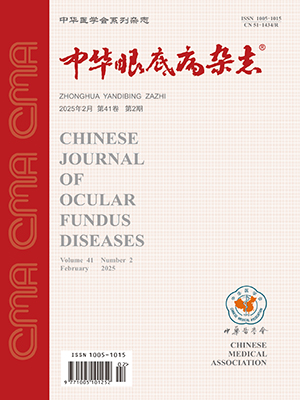| 1. |
|
| 2. |
Wong WL, Su X, Li X, et al. Global prevalence of age-related macular degeneration and disease burden projection for 2020 and 2040: a systematic review and meta-analysis[J/OL]. Lancet Glob Health, 2014, 2(2): e106-e116[2014-01-03]. https://pubmed.ncbi.nlm.nih.gov/25104651/. DOI: 10.1016/S2214-109X(13)70145-1.
|
| 3. |
|
| 4. |
Akhtar-Schäfer I, Wang L, Krohne TU, et al. Modulation of three key innate immune pathways for the most common retinal degenerative diseases[J/OL]. EMBO Mol Med, 2018, 10(10): e8259[2018-10-01]. https://pubmed.ncbi.nlm.nih.gov/30224384/. DOI: 10.15252/emmm.201708259.
|
| 5. |
|
| 6. |
Au NPB, Ma CHE. Neuroinflammation, microglia and implications for retinal ganglion cell survival and axon regeneration in traumatic optic neuropathy[J/OL]. Front Immunol, 2022, 13: 860070[2022-04-04]. https://pubmed.ncbi.nlm.nih.gov/35309305/. DOI: 10.3389/fimmu.2022.860070.
|
| 7. |
|
| 8. |
|
| 9. |
|
| 10. |
Wang Q, Lu M, Zhu X, et al. The role of microglia immunometabolism in neurodegeneration: focus on molecular determinants and metabolic intermediates of metabolic reprogramming[J/OL]. Biomed Pharmacother, 2022, 153: 113412[2022-07-14]. https://pubmed.ncbi.nlm.nih.gov/36076537/. DOI: 10.1016/j.biopha.2022.113412.
|
| 11. |
Guo L, Choi S, Bikkannavar P, et al. Microglia: key players in retinal ageing and neurodegeneration[J/OL]. Front Cell Neurosci, 2022, 16: 804782[2022-03-17]. https://pubmed.ncbi.nlm.nih.gov/35370560/. DOI: 10.3389/fncel.2022.804782.
|
| 12. |
Wang C, Zong S, Cui X, et al. The effects of microglia-associated neuroinflammation on Alzheimer's disease[J/OL]. Front Immunol, 2023, 14: 1117172[2023-02-22]. https://pubmed.ncbi.nlm.nih.gov/36911732/. DOI: 10.3389/fimmu.2023.1117172.
|
| 13. |
|
| 14. |
|
| 15. |
Spittau B. Aging microglia-phenotypes, functions and implications for age-related neurodegenerative diseases[J/OL]. Front Aging Neurosci, 2017, 9: 194[2017-06-14]. https://pubmed.ncbi.nlm.nih.gov/28659790/. DOI: 10.3389/fnagi.2017.00194.
|
| 16. |
|
| 17. |
|
| 18. |
|
| 19. |
|
| 20. |
|
| 21. |
|
| 22. |
|
| 23. |
Willmann C, Brockmann K, Wagner R, et al. Insulin sensitivity predicts cognitive decline in individuals with prediabetes[J/OL]. BMJ Open Diabetes Res Care, 2020, 8(2): e001741[2020-11-01]. https://pubmed.ncbi.nlm.nih.gov/33203727/. DOI: 10.1136/bmjdrc-2020-001741.
|
| 24. |
Yu C, Lad EM, Mathew R, et al. Microglia at sites of atrophy restrict the progression of retinal degeneration via galectin-3 and Trem2[J/OL]. J Exp Med, 2024, 221(3): e20231011[2024-03-04]. https://pubmed.ncbi.nlm.nih.gov/38289348/. DOI: 10.1084/jem.20231011.
|
| 25. |
|
| 26. |
|
| 27. |
|
| 28. |
|
| 29. |
|
| 30. |
|
| 31. |
|
| 32. |
Zhang S, Lachance BB, Mattson MP, et al. Glucose metabolic crosstalk and regulation in brain function and diseases[J/OL]. Prog Neurobiol, 2021, 204: 102089[2021-06-10]. https://pubmed.ncbi.nlm.nih.gov/34118354/. DOI: 10.1016/j.pneurobio.2021.102089.
|
| 33. |
Lauro C, Limatola C. Metabolic reprograming of microglia in the regulation of the innate inflammatory response[J/OL]. Front Immunol, 2020, 11: 493[2020-03-20]. https://pubmed.ncbi.nlm.nih.gov/32265936/. DOI: 10.3389/fimmu.2020.00493.
|
| 34. |
Lauro C, Chece G, Monaco L, et al. Fractalkine modulates microglia metabolism in brain ischemia[J/OL]. Front Cell Neurosci, 2019, 13: 414[2019-09-13]. https://pubmed.ncbi.nlm.nih.gov/31607865/. DOI: 10.3389/fncel.2019.00414.
|
| 35. |
|
| 36. |
|
| 37. |
|
| 38. |
|
| 39. |
|
| 40. |
|
| 41. |
|
| 42. |
|
| 43. |
|
| 44. |
|
| 45. |
Fairley LH, Wong JH, Barron AM. Mitochondrial regulation of microglial immunometabolism in Alzheimer’s disease[J/OL]. Front Immunol, 2021, 12: 624538[2021-02-25]. https://pubmed.ncbi.nlm.nih.gov/33717134/. DOI: 10.3389/fimmu.2021.624538.
|
| 46. |
Chen H, Guo Z, Sun Y, et al. The immunometabolic reprogramming of microglia in Alzheimer’s disease[J/OL]. Neurochem Int, 2023, 171: 105614[2023-09-23]. https://pubmed.ncbi.nlm.nih.gov/37748710/. DOI: 10.1016/j.neuint.2023.105614.
|
| 47. |
|
| 48. |
|
| 49. |
|
| 50. |
Wang Y, Han S, Chen J, et al. PFKFB3 knockdown attenuates amyloid β-induced microglial activation and retinal pigment epithelium disorders in mice[J/OL]. Int Immunopharmacol, 2023, 115: 109691[2023-01-11]. https://pubmed.ncbi.nlm.nih.gov/36638665/. DOI: 10.1016/j.intimp.2023.109691.
|
| 51. |
|
| 52. |
|
| 53. |
|
| 54. |
|
| 55. |
|
| 56. |
|
| 57. |
Ibuki M, Lee D, Shinojima A, et al. Rice bran and vitamin B6 suppress pathological neovascularization in a murine model of age-related macular degeneration as novel HIF inhibitors[J/OL]. Int J Mol Sci, 2020, 21(23): 8940[2020-11-25]. https://pubmed.ncbi.nlm.nih.gov/33255657/. DOI: 10.3390/ijms21238940.
|
| 58. |
Lin FL, Cheng YW, Chen LH, et al. Retinal protection by fungal product theissenolactone B in a sodium iodate-induced AMD model through targeting retinal pigment epithelial matrix metalloproteinase-9 and microglia activity[J/OL]. Biomed Pharmacother, 2023, 158: 114138[2022-12-17]. https://pubmed.ncbi.nlm.nih.gov/36535199/. DOI: 10.1016/j.biopha.2022.114138.
|
| 59. |
Sghaier R, Perus M, Cornebise C, et al. Resvega, a nutraceutical preparation, affects NFκB pathway and prolongs the anti-VEGF effect of bevacizumab in undifferentiated ARPE-19 retina cells[J/OL]. Int J Mol Sci, 2022, 23(19): 11704[2022-10-03]. https://pubmed.ncbi.nlm.nih.gov/36233006/. DOI: 10.3390/ijms231911704.
|
| 60. |
|
| 61. |
|




